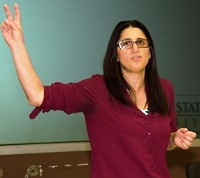A Wayne State University School of Medicine resident alumna and former faculty member will be the first recipient of a new award that recognizes immigrant leaders in American health care.
Mona Hanna-Attisha, M.D., will receive the Vilcek-Gold Award for Humanism in Healthcare in November during Learn Serve Lead 2019: The AAMC Annual Meeting, in Phoenix, Ariz.
The new joint award comes from the Vilcek Foundation and The Arnold P. Gold Foundation. The award seeks to honor the impact of humanism and compassion in medicine while spotlighting immigrant leaders in American health care.
honor the impact of humanism and compassion in medicine while spotlighting immigrant leaders in American health care.
Dr. Hanna-Attisha completed her Wayne State University residency at the Detroit Medical Center Children's Hospital of Michigan, serving as chief resident in 2006, and was an attending physician with the Department of Pediatrics' Division of Ambulatory Pediatrics and Adolescent Medicine before joining Flint's Hurley Medical Center in 2011.
Now a pediatrician and associate professor at Michigan State University College of Human Medicine, she drew nationwide attention to the widespread lead-poisoning of children in Flint, Mich., through the public water supply. In September 2015, Dr. Hanna-Attisha’s research uncovered high blood lead levels in Flint children after the city’s water supply was switched to a new source. Despite denials from state officials that the water source was responsible for the elevated blood lead levels, her persistent advocacy, along with that of Flint community activists, forced city management to acknowledge wrongdoing, switch the water supply back to a safe source and commit to long-term public health measures to mitigate the lead poisoning.
Dr. Hanna-Attisha was born in the United Kingdom to parents of Iraqi descent. With the rise of oppression under the dictatorship of Saddam Hussein, her family immigrated to the United States in 1980. She and her family settled in Michigan, where she received her bachelor’s and master’s degrees in public health from the University of Michigan and her medical degree from Michigan State University College of Human Medicine. Her commitment to humanism in health care was evident in her work early on. In 2011, as a WSU faculty member, she was recognized as a role model of humanistic care and inducted into the Gold Humanism Honor Society.
She has testified before the United States Congress twice, was presented the Freedom of Expression Courage Award by PEN America, and was named one of Time magazine’s 100 Most Influential People in the World. In her book, “What the Eyes Don’t See: A Story of Crisis, Resistance, and Hope in an American City,” Dr. Hanna-Attisha writes, “Physicians need to be trained to see symptoms of the larger structural problems that will bedevil a child’s health and well-being more than a simple cold ever could … . When we know about the child’s environment, we can treat these kids in the best, most holistic way, which will leave them with much more than just a prescription for amoxicillin.”
The award includes an unrestricted cash prize of $10,000, which the doctor has pledged to donate to the Flint Kids Fund, part of The Community Foundation of Greater Flint, a 501(c)(3) nonprofit organization.
During the AAMC meeting in Phoenix, Dr. Hanna-Attisha will share her insights as part of the Voices in Medicine and Society lecture series.
“One does not have to look far to find evidence of immigrant contributions to American society, and medicine is no exception,” said Jan Vilcek, chief executive officer and chairman of the Vilcek Foundation. “With the Vilcek-Gold Award, we are proud to honor immigrants in health care who serve the American public with both their hearts and their minds.”
The Vilcek Foundation, established in 2000 by Jan and Marica Vilcek, immigrants from the former Czechoslovakia, works to raise awareness of immigrant contributions in America and fosters appreciation of the arts and sciences.
The Arnold P. Gold Foundation was created to infuse the human connection into health care. The foundation engages schools, health systems, companies and individual clinicians in the meaning of humanistic health care. Its honor society has more than 160 chapters at medical schools and residency programs, including the WSU School of Medicine.